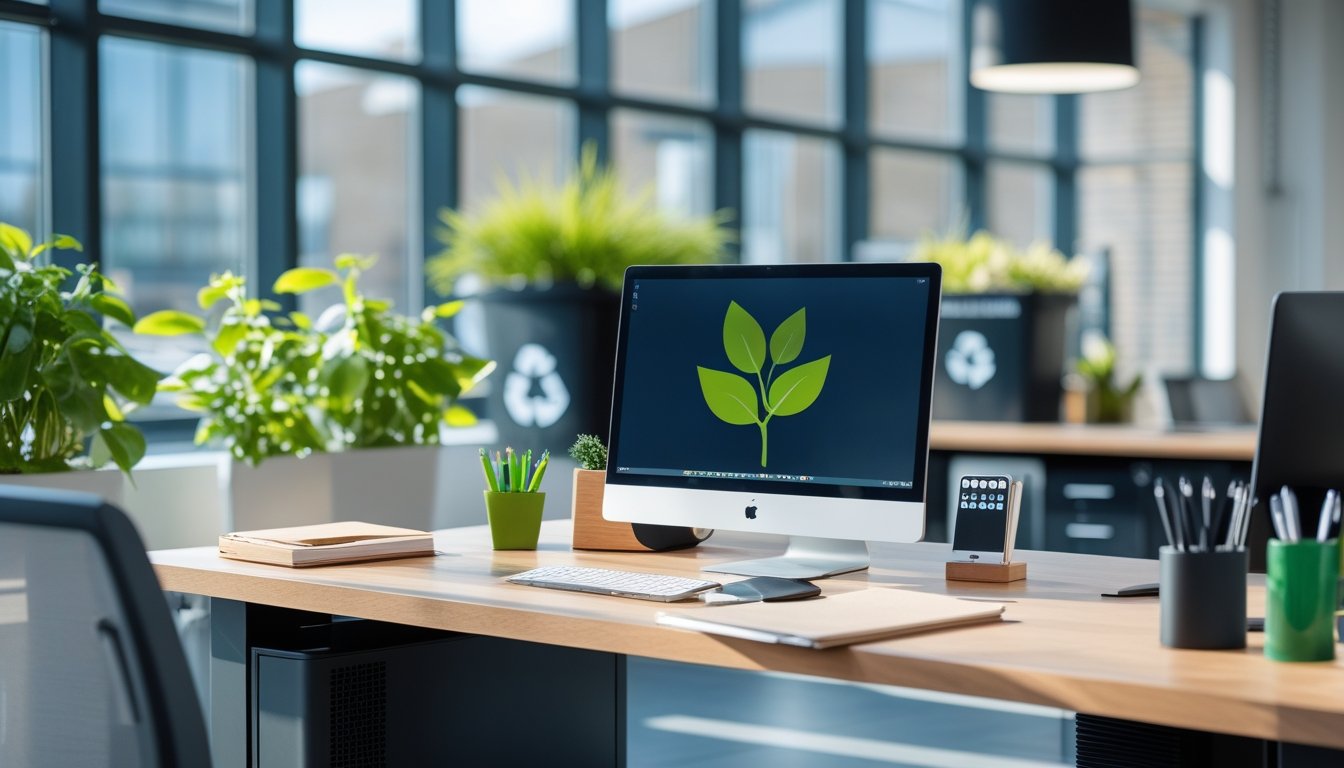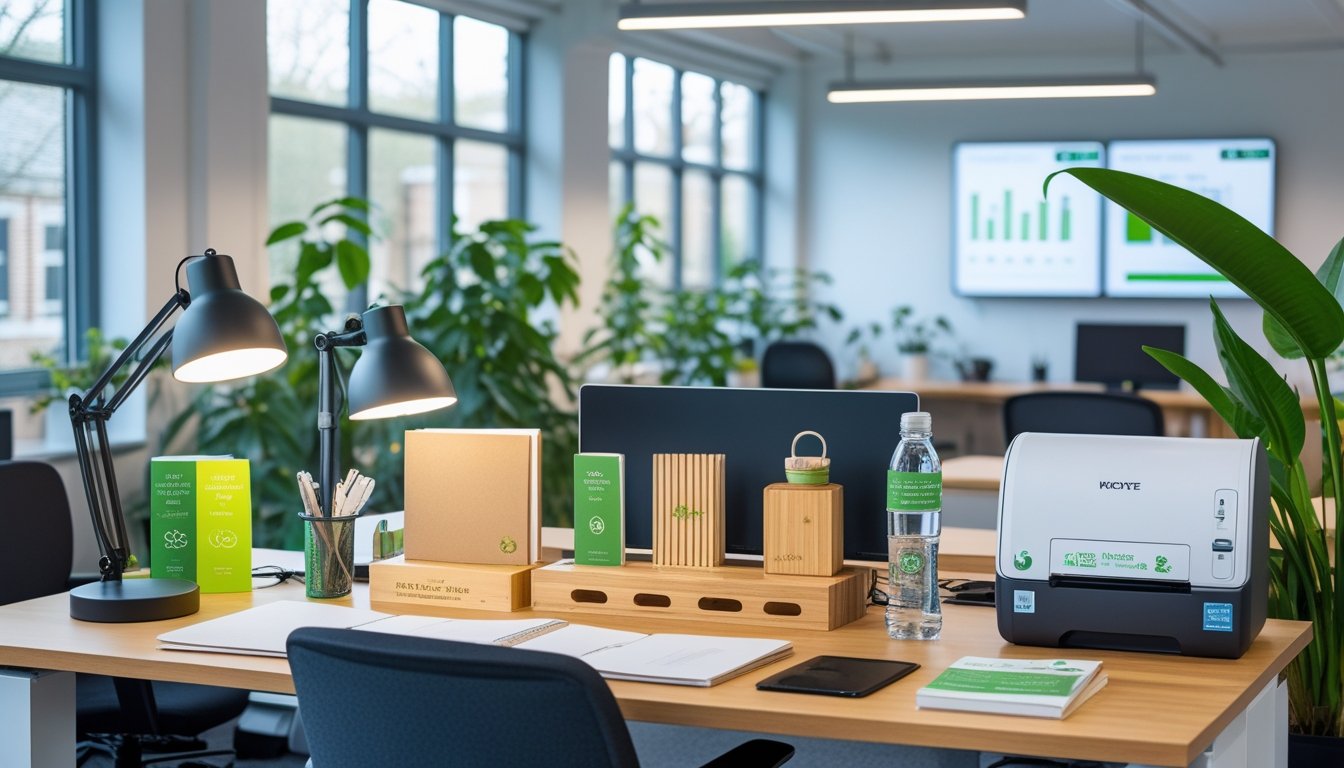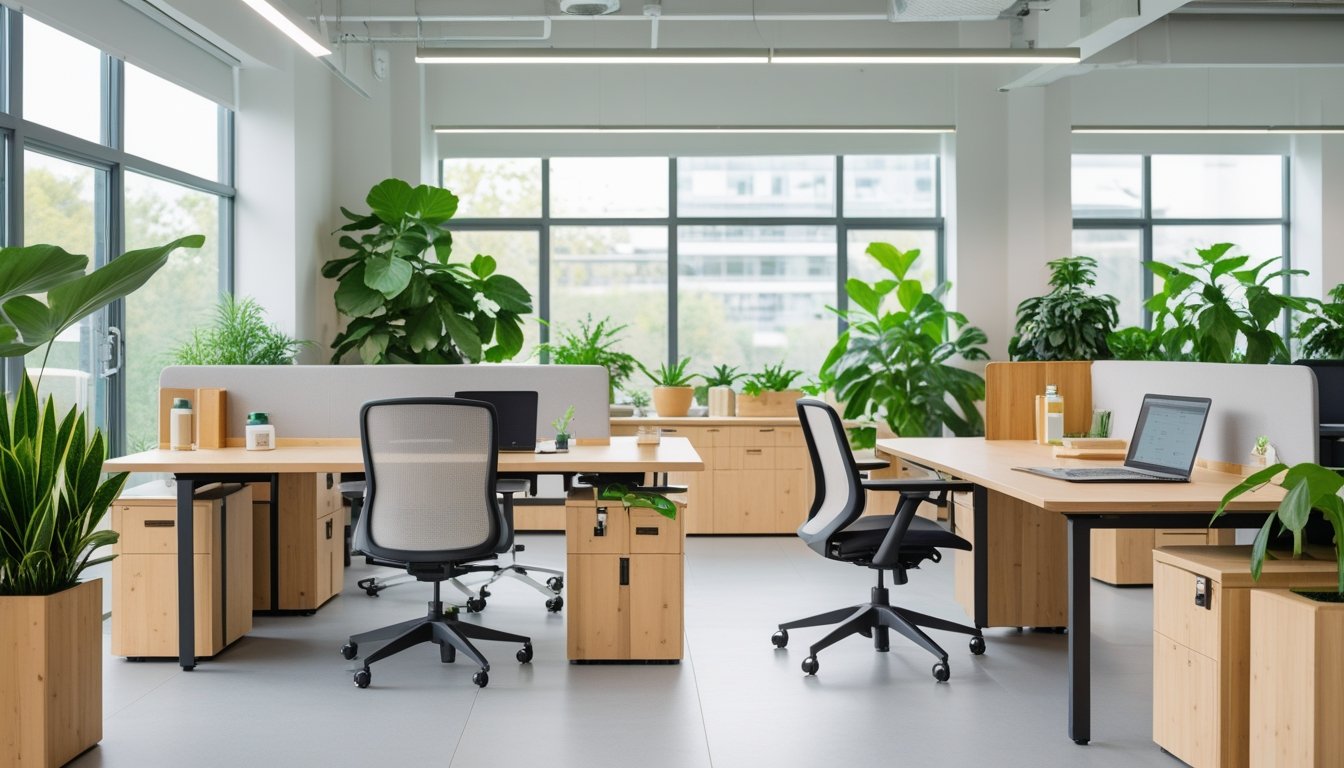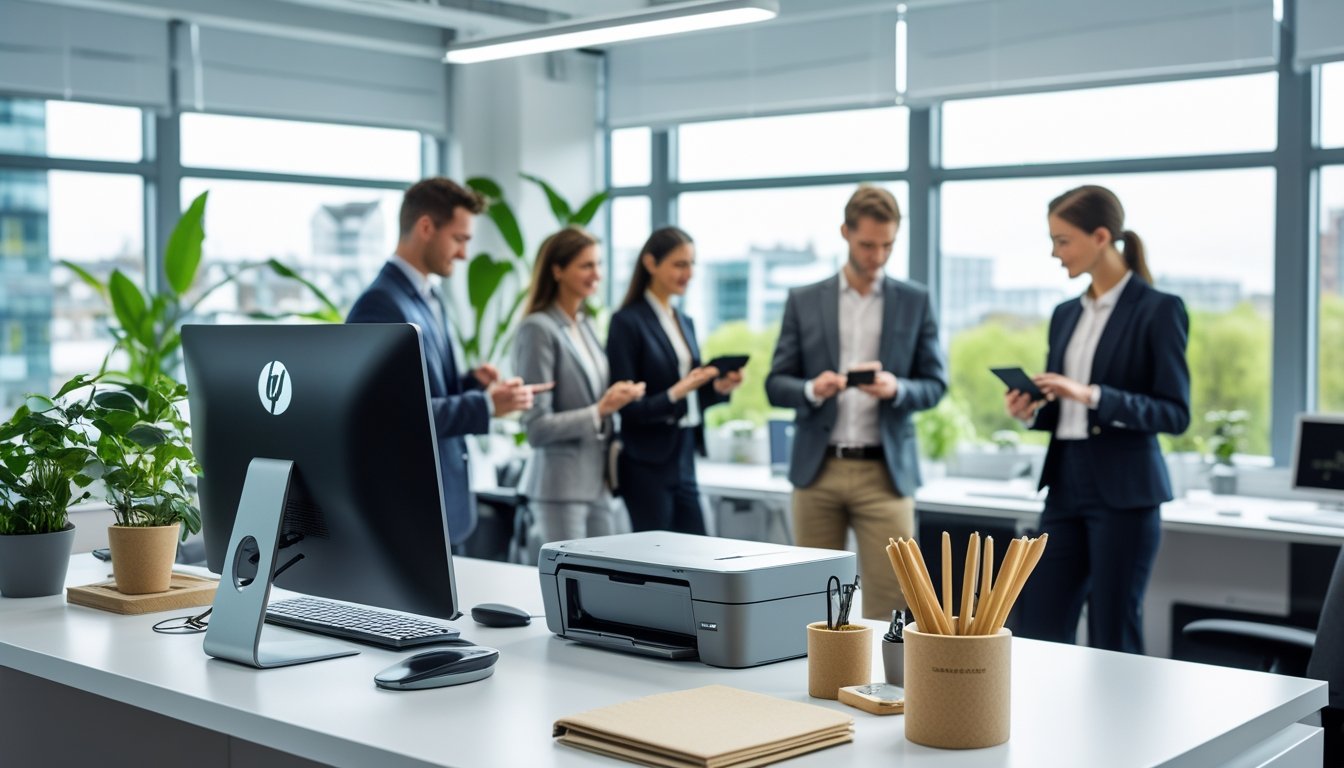Late updated: 19 Oct 2025 10:10
Written by: Amber Collins
Eco-Friendly Office Equipment For UK Businesses: Enhance Sustainability Efforts
In today's business landscape, incorporating eco-friendly office equipment is not just an option but a necessity for UK businesses striving to meet sustainability goals. Opting for eco-friendly supplies not only helps reduce environmental impact but also signals a commitment to corporate responsibility, inviting positive recognition from clients and partners alike. From energy-efficient lighting to FSC-certified paper, sustainable choices abound, enabling organisations to reduce their carbon footprint effectively.

We're not just talking about recycled paper clips; the market is flooded with innovative solutions that encompass everything from solar-powered chargers to compostable packaging. With numerous businesses in the UK leading the charge in providing such sustainable options, it's easier than ever for offices to switch to green alternatives. High-quality eco-friendly supplies often come with the benefit of durability, providing long-term savings while still supporting environmental goals.
A sustainable office environment not only cuts down on waste but also promotes a healthier, more productive workspace. Employees feel more engaged and motivated when they know their workplace prioritises eco-conscious practices. Incorporating eco-friendly furniture adds to the aesthetics of the office while ensuring a responsible use of resources. As we explore various products designed for a greener office, the potential for impactful change becomes readily apparent.
Key Takeaways
- Eco-friendly office equipment supports sustainability goals.
- Using sustainable solutions can enhance workplace wellbeing.
- UK businesses have access to a wide range of green office supplies.
Key Types Of Eco-Friendly Office Equipment For UK Businesses

Adopting eco-friendly office equipment allows us to make impactful changes towards sustainability. Embracing energy-efficient electronics, using sustainable consumables, and investing in smart waste-minimising solutions can significantly reduce our environmental footprint while enhancing productivity.
Energy-Efficient Electronics And Devices
In the modern office, energy-efficient electronics are not just a preference; they are crucial. Devices with the Energy Star label, for instance, consume less electricity without compromising performance. This includes computers, monitors, and printers that power down during inactivity. By selecting these devices, we reduce energy consumption and operational costs while maintaining efficiency and functionality.
Additionally, LED lighting outperforms traditional bulbs in both lifespan and energy use. Motion sensors also play a role in conserving energy by ensuring lights are only on when needed. Implementing these technologies makes our office environment more sustainable.
Sustainable And Recycled Consumables
Sustainable office consumables represent a key component of eco-friendly operations. For paper products, using recycled paper reduces our reliance on virgin resources, lessening the impact on forests and the environment. We can choose paper with high post-consumer content and certification from organisations such as the Forest Stewardship Council (FSC).
Moreover, ink and toner cartridges can be refilled or recycled, greatly reducing waste. Soy-based inks offer a greener alternative to conventional petroleum-based inks. In our office kitchens, biodegradable utensils and cups minimise the environmental impact of disposables. By selecting these products, we champion sustainability and demonstrate corporate responsibility.
Smart Solutions To Minimise Waste
Innovative solutions are available to help minimise waste in our offices. Implementing digital document management reduces paper use by transitioning to digital formats, which also enhances accessibility and collaboration. Implementing a structured recycling programme encourages waste segregation, making it easier to divert materials from landfills.
Furthermore, using smart bins can automate waste sorting, improving recycling rates. Composting organic waste from office kitchens further contributes to waste reduction. By integrating these smart solutions, we demonstrate our commitment to sustainability and foster a green workplace culture.
Eco-Conscious Office Furniture And Workplace Wellbeing

Creating a workplace that prioritises both sustainability and employee wellbeing involves selecting furniture that is environmentally friendly and supports health. Let's explore important considerations like sustainable sourcing, ergonomic benefits, and the role of materials in maintaining a healthy indoor environment.
Sustainable Furniture Materials And Sourcing
Sustainable sourcing is crucial in selecting eco-friendly office furniture. We should focus on pieces made from renewable materials such as bamboo or recycled metals. Wood options certified by the Forest Stewardship Council (FSC) ensure responsible forestry practices. Using these materials not only preserves ecosystems but also aligns with corporate sustainability goals. Moreover, furniture produced through energy-efficient methods further reduces environmental impact. By making these conscious choices, we create a workspace reflective of our ecological values.
Ergonomic Chairs And Employee Health
Ergonomic chairs significantly contribute to employee health and productivity. They support proper posture, reducing the risk of musculoskeletal issues like back pain. Adjustable features, including seat height and lumbar support, allow individual customisation, enhancing comfort. When our team is more comfortable, productivity naturally increases. Additionally, ergonomic furniture demonstrates a commitment to employee wellbeing and can reduce absenteeism related to physical discomfort. Therefore, choosing ergonomic options is a vital component of an eco-conscious workplace.
Indoor Air Quality With Low-VOC Materials
Using low-VOC (Volatile Organic Compound) materials is essential for maintaining good indoor air quality. Many traditional office furniture pieces release VOCs, which can contribute to respiratory issues and other health problems. By opting for furniture with low emissions, such as those using water-based finishes or adhesives, we protect air quality. Improved air quality leads to a healthier workplace, which can enhance concentration and employee satisfaction. This choice aligns with our commitment to creating a healthy, sustainable working environment.
Frequently Asked Questions

Incorporating eco-friendly office equipment in UK businesses involves understanding energy-efficient options, sustainable practices, and responsible disposal methods. It's essential to be aware of reputable certifications to make informed decisions.
What are the top-rated energy-efficient printers for UK businesses?
Energy efficiency in printers is crucial for reducing power consumption. Brands like HP, Epson, and Brother offer models with Energy Star certifications, ensuring they meet rigorous energy-saving standards. These printers use less electricity and have features such as double-sided printing, which further conserves resources.
How can companies in the UK implement a sustainable document management system?
To establish a sustainable document management system, businesses can transition to digital storage solutions. Software like DocuWare and M-Files allows for efficient electronic document management, significantly reducing paper usage. Implementing a cloud-based system also improves accessibility and backup, ensuring environmental and operational benefits.
What considerations should UK businesses make when choosing eco-friendly office furniture?
When selecting eco-friendly office furniture, consider sourcing from manufacturers that use sustainable materials like bamboo or reclaimed wood. Durability also plays a role in sustainability, so opting for pieces that are built to last reduces the need for frequent replacements. Additionally, it's beneficial to choose furniture that is easily recyclable or biodegradable.
What are the best practices for reducing energy consumption with office electronics in the UK?
To cut down energy use in electronics, businesses should enable energy-saving settings on computers and monitors, including sleep or hibernate modes. Investing in smart power strips can automatically turn off devices that are not in use. Regular maintenance and timely updates can also ensure electronics operate efficiently.
How can UK businesses ensure their IT equipment disposal is environmentally responsible?
Environmentally responsible disposal of IT equipment involves using certified e-waste recycling firms. These firms adhere to strict guidelines to recycle and dispose of electronic waste safely. It's also advisable to explore take-back programmes offered by manufacturers, where they reclaim and recycle old equipment effectively.
What certifications should UK businesses look for when selecting green office supplies?
Opt for office supplies certified by recognised eco-labels such as Fairtrade, EU Ecolabel, or FSC-certified products. These certifications assure that the products adhere to specific environmental standards and promote sustainable practices. This helps in making purchases that are both ethical and environmentally sound.
